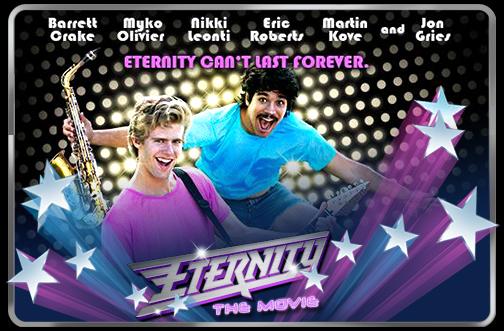aGLIFF 2014 Dispatch: 'Invisible' and 'Eternity: The Movie'

My 2014 aGLIFF adventure continued Thursday night with two films that could not be more different: Invisible and Eternity: The Movie.
A dark and dour documentary about male sex workers in Providence, Rhode Island, Invisible is a reminder of why so many moviegoers avoid documentaries. Not for its quality; it's competently made and tells a compelling story. But that story is one most people don't want to hear, a grim tale of tragic and mostly hopeless lives. Invisible is a window on a world many of us pretend doesn't exist.
Filmmaker Dio Traverso's documentary centers on Richard Holcomb, an activist and former sex worker whose mission is to improve male sex workers' lives and help them avoid contracting HIV/AIDS. Holcomb roams the gritty streets of Providence, handing out condoms and helping his clients find medical care, counseling, and whatever else they need to survive. He also lobbies the local and state governments to support long-term solutions to the sex workers' problems. (Not surprisingly, the government officials promise a lot but do very little to help.)
Invisible also introduces us to a group of male prostitutes who are brutally candid as they talk about their work. Street prostitution is a job no one wants; the hustlers in Invisible -- some homeless and all battling drug addiction -- do what they do out of complete desperation. Their lives amount to little more than turning tricks and getting high. As the film's title suggests, these men are indeed invisible; they're society's castoffs.
Invisible may be shocking to anyone unfamiliar with the street hustlers' world. But to those in the know, it reveals nothing new. While it's a harrowingly honest take on the miserable lives of hustlers, it's not particularly insightful or original. Invisible has an important message about society's indifference, but the film is mostly just a depressing look at a depressing part of the human condition.
That said, Traverso (currently studying at The University of Texas at Austin) deserves much credit for making a polished documentary on a miniscule, Kickstarter-fueled budget and for tackling a difficult subject the film industry mostly ignores.
In contrast to Invisible -- a jarring contrast, really -- Eternity: the Movie is a thoroughly silly confection about an Eighties R&B duo. The titular Eternity is a breathtakingly mediocre Hall and Oates-like act, two marginally talented young guys who find fame and fortune despite themselves.
Todd Lucas (Barrett Crake) is the duo's slightly more talented half, a naïve Midwestern singer who moves to Los Angeles hoping to make it big. He takes a job at B.J. Maxx (yes, this is the film's level of humor), where he meets saxophonist BJ Fairchild (Myko Olivier). The two become roommates and bandmates, getting their big break when Todd's friend Gina Marie (Nikki Leonti) lands them an audition with music mogul Barry Goldfield, Jr. (Jon Gries).
What follows is a goofy story of career success and failure, love and sex of the straight and gay varieties, jealousy, betrayal and so on. But the plot of Eternity: The Movie makes little sense and matters not a whit, for the film's raison d'être is to skewer all things Eighties. It does a respectable job of this, taking over-the-top potshots at the era's music, clothing, hairstyles and other pop cultural hallmarks. (Parodying Eighties music isn't easy; most of the decade's songs parody themselves. But Eternity's signature hit, "Let's Make Love, Not Just Sex," is delightfully idiotic.) The humor is gloriously juvenile and very funny when it hits its mark, which happens far less often than it should. However, the movie is so proudly campy that the bad jokes are often part of the fun.
I'll give the atrocious acting in Eternity: The Movie the benefit of the doubt and assume that director Ian Thorpe ordered the entire cast to chew the vintage scenery whenever possible. And chew it they do -- Nagel prints, stacks of videocassettes and all -- steamrolling through every scene with the nuance of, well, a fleet of steamrollers. Yikes, the performances are dreadful -- but then again, the horrid acting fits perfectly with the clunky dialogue. The leads, all newcomers, probably did their careers no favors by appearing in this featherweight festival of foolishness, and the veterans (Gries, Eric Roberts and Martin Kove) fare no better.
Eternity: The Movie isn't quite so-bad-it's-good; it's a little too dumb and not funny enough to be a comedy for the ages. (You expected me to say for eternity, didn't you.) But it's a likable bit of fluff that, when it winds up on Netflix, might be a good choice for a drunkenly amusing viewing party. (I recommend serving wine coolers, or Jack Daniels and New Coke.)


Eternity
I'd like to add that if one looks past the raw humor of Eternity, there is a more subtle, and hilarious, wit at work. Shots and jokes that poke fun at 80's pop culture tropes and pay homage to soft rock videos of the era were a joy to pick out as I watched. Contrary to Don's view, I thought Gries as the slimy, sexually frustrated record producer put his all into the role making it my favorite of his performances. Eric Roberts, usually at home in the tough-guy role was a hilarious surprise as the flamboyant manager of BJ Maxx. Eternity was funnier for me than any movie in recent memory, and I'd call it a more successful throwback than Jack Plotnick's Space Station '76, which I reviewed at SXSW. I can't wait to see this again.